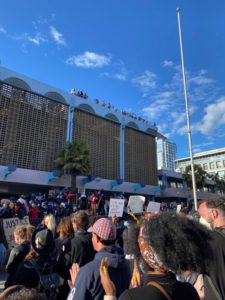On Canada Day, I joined the crowd at the Parliament Buildings. But this year it wasn’t a day filled with crowds of patriotic Canadians drunkenly singing “O Canada” to celebrate the colonial birth of their country. This year it was, as many rightfully called it, a very “unhappy birthday” celebration for Canada. And I have to say that out of any event, rally, or protest I’ve been to in Victoria, I’ve never felt hatred perpetuated by any opposing individual or group the way it was on that day.
As members of the BIPOC community were peacefully sharing their experiences and stories, a group of reactionary protesters there to speak up against government measures to stop the spread of COVID-19 created their own stage directly across from the stairs of the legislature building. And every so often, as the speaker would change in the anti-COVID-19 protest, the next one would reiterate their cries of injustice—and as they did, I could not help but feel like they were trying to silence us.

We tried our best to tune out the irate voices of the other group. We did our best to preserve the love and support we had for each member of the BIPOC community brave enough to share their truth—so much so that it was easy to assume that everyone was doing the same. At one point, a young Black woman whose parents immigrated to Canada was sharing her and her family’s experience. As she started to delve deeper into her story, a very irritated Karen felt entitled to voice her opinion about how Trudeau did not have to let her family in, implying that she should be grateful that she is even in Canada. Of course, people were furious and a young Black man came to the young woman’s defence and called out the Karen (who we could also refer to as “the white supremacist”).
But my point of telling this story is not to call out the Karen or to bring to light to what happened that day. I tell this story because a friend of mine questioned the young Black man’s reaction—she felt that he overreacted. It occurred to me that even after witnessing the white supremacist, the silencing of the loud anti-COVID-19 protesters, and the overall unwelcoming atmosphere toward the Indigenous and Black folks, it didn’t matter what the circumstances were. She still felt like maybe he could have handled that situation a bit better. Now, who are we to judge how someone reacts under the heavy weight of not only their own lived trauma but also the trauma of their ancestors?
We must understand that just as any other form of abuse is traumatic, so is racism. Being mistreated your entire life because of something that you have absolutely no control over, such as the colour of your skin or your ethnic background, is traumatic. Period. And what exactly is the acceptable way for a Black or Indigenous person to react after generations and generations of abuse?
Clearly—as I found out at that protest—in the eyes of the abuser, there isn’t one.
